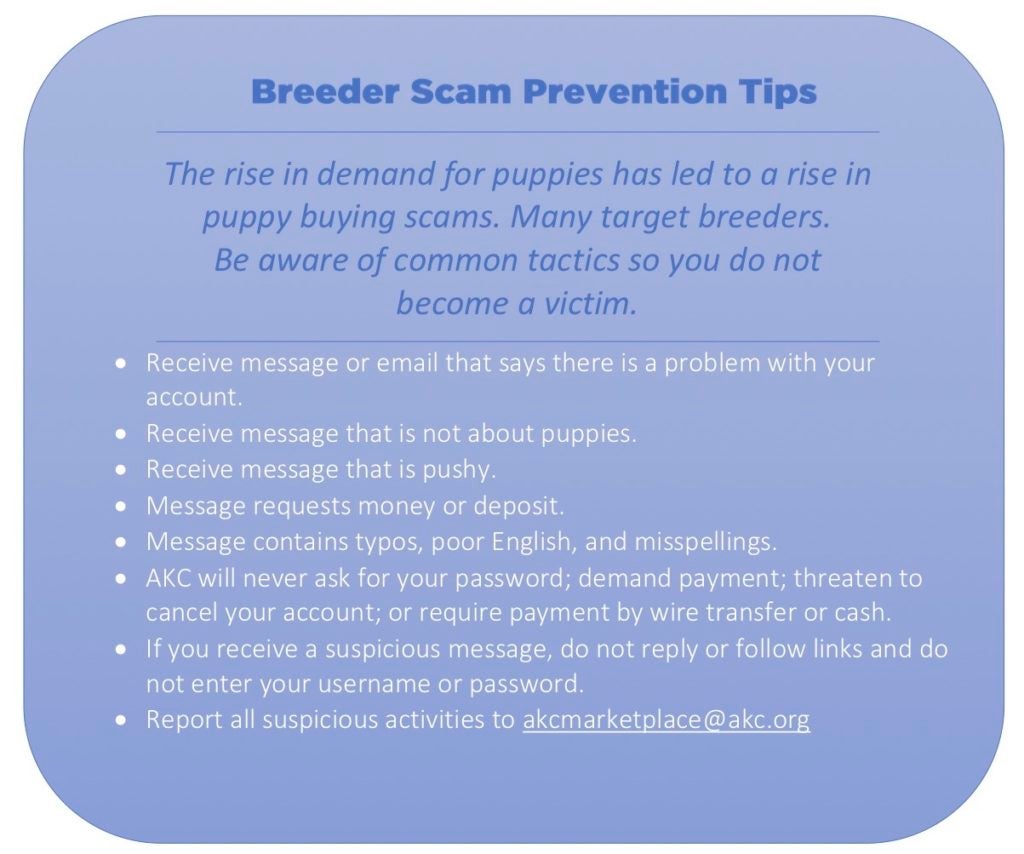
News reports say puppy buying is at an all-time high, but you have not received many communications about your new litter.
Then the phone rings and a buyer is on the line. They are outraged, demanding to know why they have not received a puppy even though they paid a deposit.
When you can get a word in, you try to explain that you did not sell them a puppy and, in fact, have never spoken to them.
This scenario is happening too often to dog breeders as criminals realize that puppies are in big demand during this time of people working from home.
“These bad guys go after what is increasing in popularity because it is all about money to these phishers,” said Tim Pursell, Director of AKC IT Shared Services.
Scammers are on the hunt for ways to compromise the accounts of dog breeders and take control of their puppy sales.
“Phishers pretend to be someone they are not, like part of the AKC staff or a support service, and then they create urgency. They say something is wrong with the breeder’s account and they cannot sell any more puppies until they click on a link and provide credentials,” Pursell said. “The breeder does not want to lose a day of promoting their litters, so they click, give their login and password, and then the phisher takes control of their account.”
The phishers change the account information, including emails and phone numbers, so puppy buyers begin communicating with the bad guys, unbeknownst to the breeder.
They create the same sense of urgency with puppy buyers so they can quickly get their cash and then they disappear. No puppy materializes. Some buyers find other ways to track down the breeder, such as through social media, and then both parties discover the fraud.
“People are so eager to get a puppy that the phisher will tell them that they have one puppy left and someone is coming to look at it that afternoon, but if they send $500 immediately, they will hold the puppy,” Pursell said.
There are many variations of the messages sent to breeders, but the phisher’s approach is generally the same. The email will be made to look like it is coming from an AKC or other official department and will state that the breeder’s account has been suspended for a security reason. The messages often have poor English, punctuation or spelling.
In addition to emails, phishers use text to send fraudulent messages.
“The AKC wants to prepare our breeders so they can easily identify a scam and stop it before it begins,” said Kirsten Bahlke, AKC Vice President of Consumer Demand. “Breeders should report anything suspicious immediately to AKC.”
AKC has created a list of warning signs that appears when breeders log into AKC Marketplace. Breeders should be aware of the tactics so they can avoid falling victim to a scam.
Here are some warning signs and safety tips:
- Message or email says there is a problem with your account.
- Message is not about puppies.
- Message is pushy.
- Message requests money or deposit.
- Message contains typos, poor English, and misspellings.
- AKC will never ask for your password; demand payment; threaten to cancel your account; or require payment by wire transfer or cash.
- AKC will never text you a message regarding your account.
- If you receive a suspicious message, do not reply or follow links, and do not enter your username or password.
- Report all suspicious activities to akcmarketplace@akc.org


